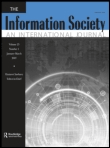
INFORMATION SOCIETY
Scope & Guideline
Advancing Knowledge at the Intersection of Culture and Technology
Introduction
Aims and Scopes
- Digital Governance and Policy:
The journal examines how digital technologies shape governance structures and public policies, focusing on transparency, accountability, and the impact of social media on political processes. - Social Impacts of Technology:
Research highlights the social implications of digital innovations, including issues of digital inequality, civic engagement, and the socio-cultural dimensions of technology adoption. - Economic Dimensions of Digital Platforms:
The journal explores the economic aspects of the digital economy, including gig work, platform profitability, and the implications of algorithmic management on labor. - Cultural Studies and Digital Media:
A core area of focus is the analysis of digital media as cultural artifacts, investigating how information technologies influence cultural practices and identity formation. - Interdisciplinary Approaches to ICT:
The journal promotes interdisciplinary methodologies, integrating insights from communication studies, sociology, political science, and economics to address complex issues related to information society.
Trending and Emerging
- Digital Activism and Social Movements:
Research on digital activism has gained traction, focusing on how social media platforms facilitate mobilization and political engagement, especially in authoritarian contexts. - Algorithmic Governance and Surveillance:
There is an increasing interest in how algorithms govern social interactions and influence behavior, with studies examining the implications of surveillance technologies in various contexts. - Digital Inequality and Inclusion:
Emerging research highlights issues of digital inequality, particularly in relation to marginalized groups, emphasizing the need for inclusive digital policies and practices. - Economic Implications of Gig Work:
The gig economy has become a focal point of study, exploring how digital platforms reshape labor dynamics, worker rights, and economic opportunities. - Cultural Implications of Datafication:
The journal is witnessing a growing interest in the cultural ramifications of datafication, examining how data practices affect identity, community, and social relations.
Declining or Waning
- Traditional Media Studies:
There is a noticeable decrease in research focused on traditional media, such as television and print journalism, as the emphasis shifts towards digital media and online platforms. - Static Models of Communication:
Research employing static models of communication has waned, as scholars increasingly adopt dynamic and networked approaches that reflect the complexities of digital interactions. - Non-Digital Literacy:
The focus on non-digital literacy has diminished, with greater attention now directed towards digital literacy and the skills necessary for navigating the information society. - Conventional Privacy Concerns:
While privacy remains a crucial topic, traditional concerns about privacy are being overshadowed by broader discussions on surveillance, data ethics, and algorithmic governance.
Similar Journals
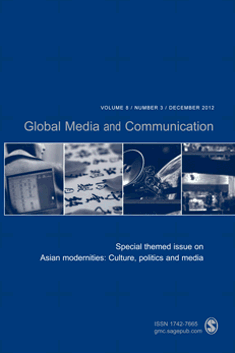
Global Media and Communication
Connecting Ideas Across Borders in Media and CommunicationGlobal Media and Communication is a premier journal dedicated to advancing the fields of media and communication studies, published by SAGE Publications Ltd. With an ISSN of 1742-7665 and an E-ISSN of 1742-7673, this journal offers a platform for scholarly discourse and innovative research that explores the intricate relationships between global media practices and communication strategies. Recognized as a Q1 journal in both the Arts and Humanities (Miscellaneous) and Communication categories for 2023, it stands out in its commitment to delivering high-quality, peer-reviewed articles that contribute to the understanding of contemporary media landscapes. Located in London, United Kingdom, the journal benefits from being at the heart of cultural and digital innovation. Researchers, professionals, and students can look forward to insightful articles that not only critique existing frameworks but also propose new methodologies, ensuring that Global Media and Communication remains a vital resource for anyone interested in navigating the evolving dynamics of media and communication on a global scale.

African Journal of Library Archives and Information Science
Championing Best Practices in Information Services.The African Journal of Library Archives and Information Science (ISSN: 0795-4778; E-ISSN: 0795-4778) is a pivotal publication in the field of Library and Information Sciences, published by ARCHLIB & INFORMATION SERVICES LTD in Nigeria. With a focus on the diverse and evolving challenges faced by libraries and information professionals in the African context, this journal serves as a platform for scholarly communication, fostering innovation and collaboration among researchers, practitioners, and academics. The journal has a notable impact factor, reflected in its Q3 ranking within the category for 2023, and is indexed in Scopus, holding a percentile rank of 22nd in its field, further validating its relevance and scholarly contribution. Running since 2008 with continual publications through to 2024, the journal aims to advance knowledge, share best practices, and highlight emerging trends in librarianship and information science across Africa and beyond. By offering open access options, it ensures wide dissemination of knowledge, making it an essential resource for those dedicated to enhancing information services and archives.

Mir Rossii-Universe of Russia
Connecting Research and Policy for a Better FutureMir Rossii-Universe of Russia is a prominent academic journal published by the NATIONAL RESEARCH UNIVERSITY HIGHER SCHOOL OF ECONOMICS in the Russian Federation. With an ISSN of 1811-038X and an E-ISSN of 1811-0398, this journal has established itself as a significant platform for scholarly discourse in the fields of Demography, Development, Economics and Econometrics, and Sociology and Political Science. Highlighted by a Q3 categorization in its respective fields for 2023, the journal offers vital insights and empirical research that contribute to our understanding of socio-economic dynamics, fostering a comprehensive dialogue among researchers, practitioners, and policy-makers. Although it adheres to traditional publication formats rather than open access, its contributions are essential for those engaged in the complexities of societal development and economic policies. With a sustained commitment to quality, Mir Rossii-Universe of Russia continues to serve as a critical resource for academics and students seeking to navigate the rapidly evolving landscapes of social sciences.

Information Communication & Society
Illuminating Contemporary Issues in Digital CommunicationInformation Communication & Society, published by Routledge Journals, Taylor & Francis Ltd, is a premier journal in the fields of communication and library and information sciences, boasting an impressive impact factor and consistently high rankings in Scopus, including Rank #18/511 in Communication and Rank #14/280 in Library and Information Sciences for 2023. With its focus on the dynamic interplay between information technology and society, the journal serves as a vital platform for researchers, professionals, and students, facilitating the discussion of contemporary issues that shape digital environments. Since its inception in 2001 and converging from 2005 to 2024, the journal has maintained a rigorous peer-review process to ensure that it publishes high-quality research that contributes to ongoing debates and developments in the digital age. Although it does not offer open access, the journal's esteemed reputation and Q1 categorization underscore its impact within the academic community, making it an essential resource for anyone interested in the evolution of communication in the modern world.
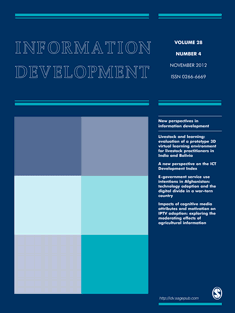
Information Development
Illuminating Contemporary Challenges in Information AccessInformation Development, published by SAGE Publications Ltd, is a prestigious journal focusing on the dynamic intersection of library science and information development. With an ISSN of 0266-6669 and an E-ISSN of 1741-6469, this journal has established itself as a critical resource for researchers, professionals, and scholars in the field since its inception in 1985. With a 2023 Q2 ranking in Library and Information Sciences and a commendable Scopus rank, falling within the 82nd percentile among its peers, the journal provides an invaluable platform for the dissemination of cutting-edge research and innovative practices. Notably positioned in the United Kingdom, the journal offers insightful explorations of contemporary challenges and advancements in information access, management, and policy. Although currently not an Open Access journal, it continues to contribute significantly to its field by fostering a robust academic dialogue and sharing knowledge essential for the evolution of library and information sciences. Scholars and practitioners alike are encouraged to engage with Information Development as it remains instrumental in navigating the complexities of today's information landscape.
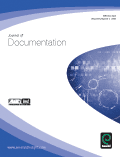
JOURNAL OF DOCUMENTATION
Pioneering Insights in Documentation and Information Sciences.JOURNAL OF DOCUMENTATION is a premier academic journal published by Emerald Group Publishing Ltd, dedicated to advancing knowledge in the fields of Information Systems and Library and Information Sciences. With an enduring legacy since its inception in 1945, this journal has established itself as a pivotal resource for researchers, professionals, and students alike, providing cutting-edge insights and comprehensive research findings relevant to the ever-evolving landscape of information management. The journal boasts a commendable impact factor and has been ranked in the Q2 category for Information Systems and Q1 for Library and Information Sciences as of 2023, reflecting its significant contribution to these fields. It is indexed in Scopus, with notable rankings in the Social Sciences and Computer Science categories, ensuring visibility and accessibility for the academic community. While the journal currently does not offer open access, it remains committed to disseminating high-quality research that informs practice and stimulates scholarly discussion locally and globally, making it a valuable asset for anyone invested in the study of documentation and information processes.

Informacios Tarsadalom
Fostering Innovative Research in Communication StudiesInformacios Tarsadalom is a prominent academic journal published by INFONIA, dedicated to the interdisciplinary study of communication within social sciences. Since its inception in 2008, this journal has emerged as a vital platform for disseminating research and insights pertinent to the evolving landscape of communication, with a particular emphasis on the unique socio-cultural context of Hungary. With a 2023 Scopus ranking of #265 out of 511 in the Communication category, placing it in the 48th percentile, it reflects the increasing recognition of its contributions to the field. Although it currently does not operate as an open-access journal, its rigorous peer-review process ensures that published articles maintain the highest academic standards. The journal's diverse scope encourages contributions that address innovative theories, empirical research, and practical applications, making it an invaluable resource for researchers, professionals, and students alike seeking to explore the complexities of communication in a rapidly changing society.
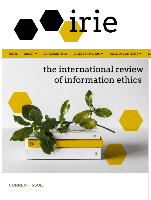
International Review of Information Ethics
Championing High-Quality Research in Information EthicsThe International Review of Information Ethics, with the ISSN 1614-1687, is a critical platform dedicated to the exploration and discourse surrounding the ethical dimensions of information in the digital age. Published by the International Center for Information Ethics, this journal seeks to address the challenges and opportunities presented by technological advancements in information dissemination, data privacy, and digital citizenship. While the journal operates on an open-access model, it ensures the dissemination of high-quality research that serves as a valuable resource for researchers, academics, professionals, and students alike. Situated in Karlsruhe, Germany, the editorial team, led by Editor-in-Chief Rafael Capurro, invites contributions that engage with contemporary ethical issues, fostering a global dialogue that is vital for the ethical stewardship of information technology. By promoting rigorous scholarship and diverse perspectives, the International Review of Information Ethics aims to influence policy and practice in the ever-evolving landscape of information ethics.
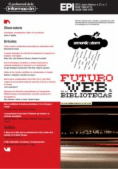
Profesional de la Informacion
Elevating Scholarship in Library and Information SciencesProfesional de la Informacion is a leading academic journal dedicated to advancing research in the fields of Communication, Cultural Studies, Information Systems, and Library and Information Sciences. Published by EDICIONES PROFESIONALES INFORMACION SL-EPI, this journal has established itself as a pivotal resource for scholars and practitioners alike since its inception in 2006, holding an impressive Q1 ranking across its categories in 2023. With an impactful presence reflected in its Scopus Rankings—33rd out of 511 in Communication and 26th out of 280 in Library and Information Sciences—Profesional de la Informacion provides a forum for innovative research and discussion. Although it operates under a subscription model, the journal’s commitment to quality research contributes significantly to the knowledge base within its fields, making it an essential read for those who are passionate about information and communication studies. Positioned in the vibrant academic landscape of Barcelona, Spain, this journal encourages submissions that explore contemporary challenges and advancements in these vital areas of study, solidifying its role as a cornerstone of scholarly discourse.

Analisi-Quaderns de Comunicacio i Cultura
Connecting scholars to shape the future of Cultural Studies.Analisi-Quaderns de Comunicacio i Cultura, published by Universitat Autònoma de Barcelona, is a distinguished open-access journal that has been serving as a pivotal platform for interdisciplinary research in Communication and Cultural Studies since its inception. With an ISSN of 0211-2175 and E-ISSN 2340-5236, this journal not only contributes significantly to its fields, as evidenced by its impressive rankings—Q2 in Communication and Q1 in Cultural Studies for 2023—but also boasts strong Scopus placements, including a rank of 181 out of 1304 in Cultural Studies. The journal's commitment to open access since 2010 ensures that research findings are readily available to a global audience, fostering collaboration among scholars, practitioners, and students. Located in Cerdanyola del Vallès, Barcelona, this publication invites contributions that explore the dynamic and rapidly evolving intersections of culture and communication, making it an essential resource for those seeking to advance knowledge and engage critically in these essential areas of study.